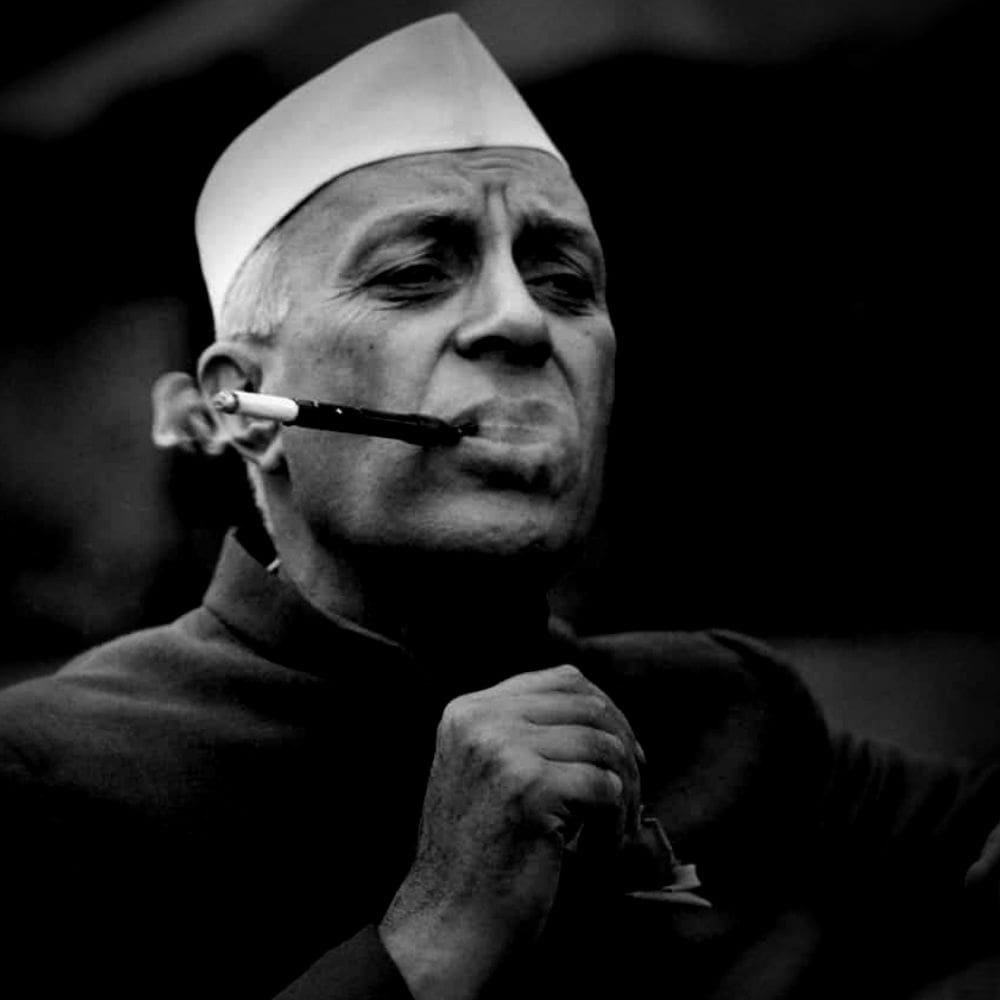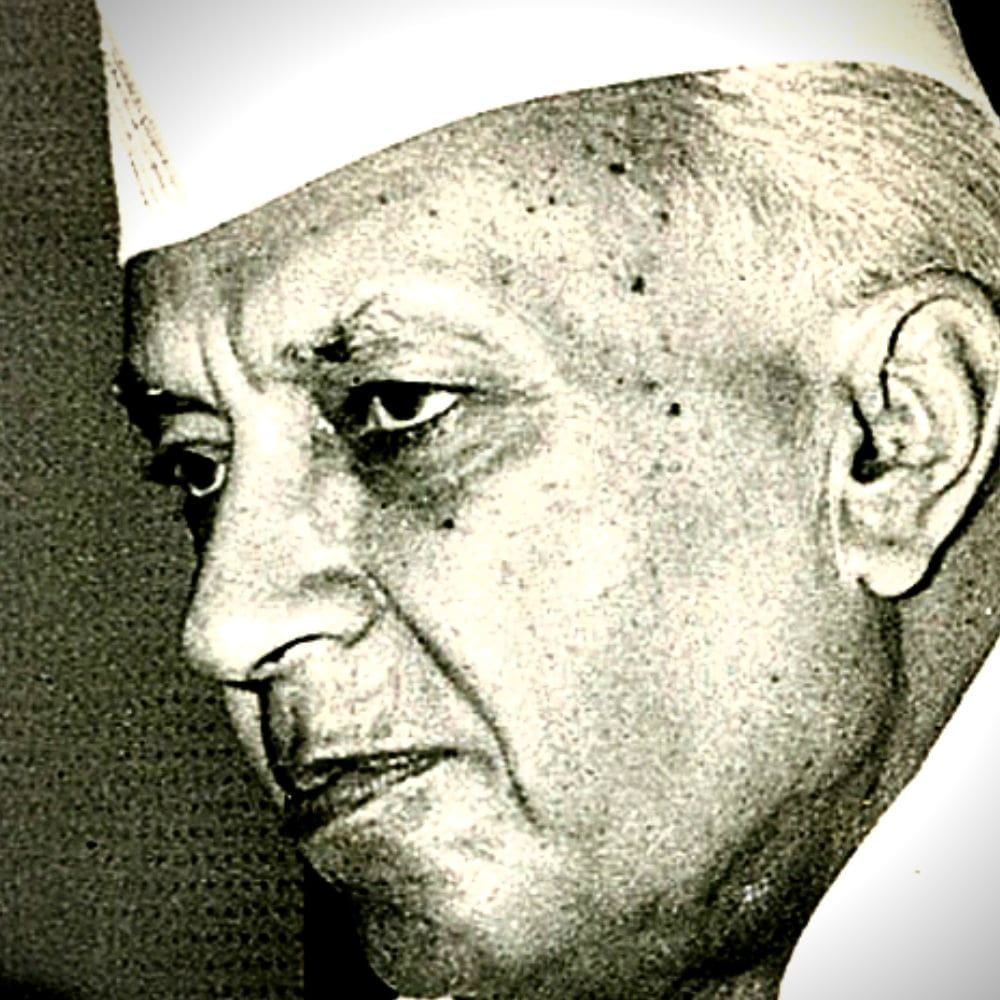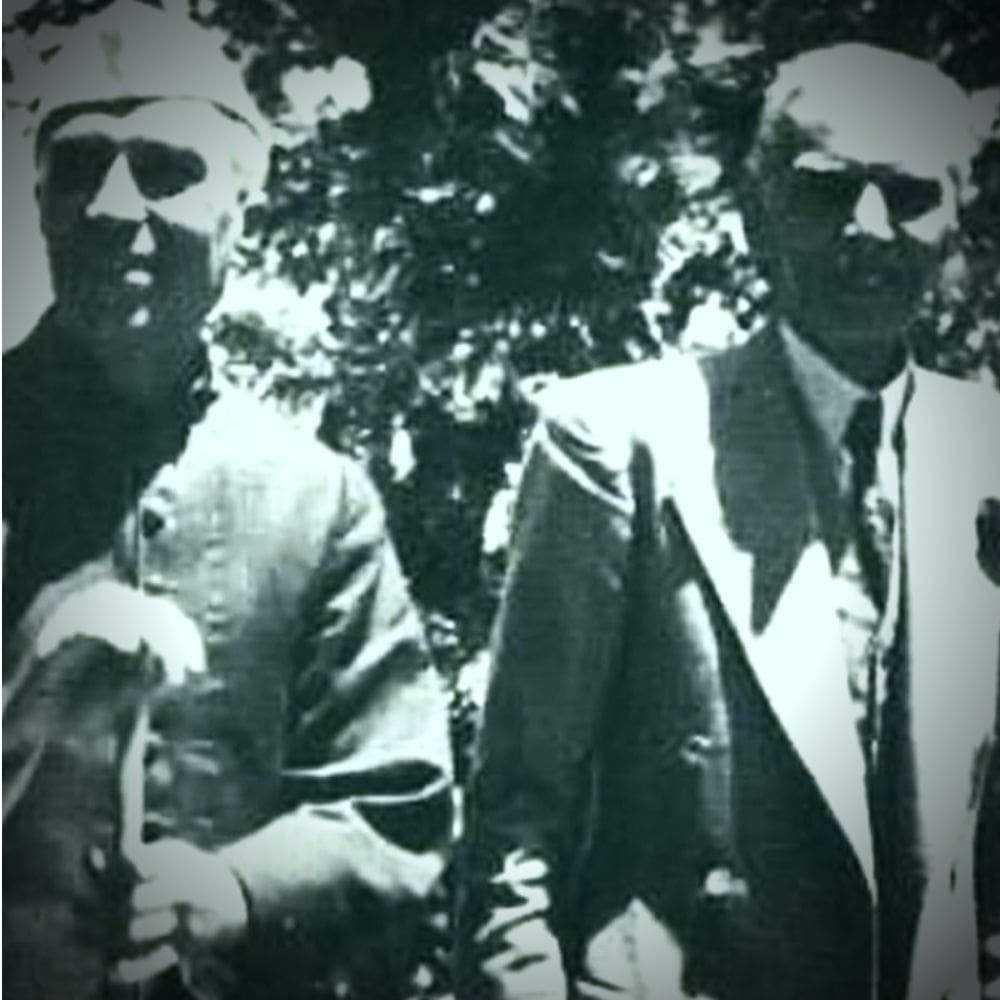NEHRU’S DEFECTIVE WORLD VIEW
Much of Nehru’s defective world view has already been covered and illustrated with examples above. We now take up those aspects that have either not been covered, or have been inadequately covered above.
NEHRU’S BLINKERED MARXIST–COMMUNIST WORLD VIEW
Marxism and socialism were something Nehru was sold out on since the 1920s. (For details on the Nehruvian Economics/Socialism, please check Blunder#64-70.) This is what Nehru said in his presidential address at the Lucknow session of the Congress in 1936:
“I am convinced that the only key to the solution of the world’s problems and of India’s problems lies in socialism, and when I use this word I do so not in a vague humanitarian way but in the scientific, economic sense. Socialism is, however, something even more than an economic doctrine; it is a philosophy of life and as such also it appeals to me. I see no way of ending the poverty, the vast unemployment, the degradation and the subjection of the Indian people except through socialism. That involves vast and revolutionary changes in our political and social structure, the ending of vested interests in land and industry, as well as the feudal and autocratic Indian States system. That means the ending of private property, except in a restricted sense, and the replacement of the present profit system by a higher ideal of co-operative service. It means ultimately a change in our instincts and habits and desires. In short, it means a new civilisation, radically different from the present capitalist order. Some glimpse we can have of this new civilisation in the territories of the U.S.S.R. Much has happened there which has pained me greatly and with which I disagree, but I look upon that great and fascinating unfolding of a new order and a new civilization as the most promising feature of our dismal age. If the future is full of hope it is largely because of Soviet Russia and what it has done, and I am convinced that, if some world catastrophe does not intervene, this new civilisation will spread to other lands and put an end to the wars and conflicts which capitalism feeds… Socialism is thus for me not merely an economic doctrine which I favour; it is a vital creed which I hold with all my head and heart…”
NEHRU’S JUVENILE FASCINATION WITH THE SOVIET MODEL THAT SEVERELY HARMED INDIA
Russia is a riddle wrapped in a mystery inside an enigma.
—Winston Churchill
If the future is full of hope it is largely because of Soviet Russia.
—Nehru
Despite the stark reality about the Soviet Union that was amply and effectively exposed through various channels, and were widely known during Nehru’s time, he persisted with promoting, defending, and rationalising the Soviet system, and selling it to all, particularly to his own compatriots, as amply obvious through his pronouncements, speeches, and books.
Nehru and his colleague and protégé, Krishna Menon, regarded Harold Laski as their guru; and “Harold Laski of the British Labour Party spent a life-time apologising for and explaining away the crimes of the Soviet Union in terms of this or that ‘compulsion of events’ or ‘historical necessity’.” Even when Stalin’s own compatriots sighed relief at his passing away on 6 March 1953, and Khrushchev later severely denounced him at the 20th Congress of the Soviet Communist Party; surprisingly (or, was it no surprise!) Nehru, if one goes by his tribute to Stalin in the Indian Parliament, seemingly felt orphaned!
Apparently, apart from a plethora of monstrous atrocities, Nehru had “never heard of those more than a million orphaned children who wandered all over Soviet Russia after Stalin’s forced collectivization had either killed off their parents or sent them to forced labour camps. Quite a large number of these children were later on physically destroyed by Stalin’s orders because they were ‘spreading disease’. Nor did he [Nehru] ever learn about those ‘child heroes’ who were acclaimed in the Soviet press and by the Soviet Government because they betrayed their parents to the Soviet secret police.”
Wrote Sita Ram Goel on Nehru’s pre-independence stands: “But the Congress had promoted an incurable Soviet-addict [Nehru] to positions of power in its highest organs, and had permitted him to become its sole spokesman on foreign policy as well as its second best mass leader. The Congress had to pay the price. It had to remain in a state of paralysis from September 1939 to August 1942. The only action taken by the Congress during this period was the resignation of its Provincial Ministries under direction from another resolution drafted by Pandit Nehru and passed by the Congress Working Committee in October 1939. All its other attempts at political action, whether it was an attempt at cooperation with the British Government under the lead given by Rajaji in early 1940 or an attempt at direct action through individual civil disobedience, were half-hearted hazards devoid of all sense of self- confidence.”
“And the Congress frittered away its moral reputation as an organisation of fighters for human freedom when it refused to say even a single word of protest against the Stalin-Hitler Pact [1939], against the invasion of Poland and Finland by the Soviet Red Army, and against the incorporation of half of Poland and three independent Baltic States— Latvia, Lithuania, Estonia—in the Soviet Slave Empire.”
“What was really fantastic in the whole situation was this Don Quixote of the Soviet Union [Nehru]. All through his life he had learnt nothing except going to jail properly garlanded and coming out of jail properly garlanded. But he had the cheek to ask a disarmed and downtrodden nation [Indians] to fight in defence of a cause [Soviet Union] which now sounded criminal to most of his countrymen. No one in the Soviet Union or her vast Comintern network had said a word in support of the case for India’s independence.”
“It was not an accident that in the volumes of the communist war-time weekly, People’s War, there was not a word of criticism against Pandit Nehru while Mahatma Gandhi and other Congress leaders were wildly abused. The weekly cartooned Subhas Bose as a donkey and a dog and a rat and a rogue in fascist employ. The Communist Party of India denounced the Congress Socialists and Forward Blocists as agents of German-Japanese imperialism and regularly informed the British police about their activities. But all through this period [1940 onwards] Pandit Nehru and Maulana Azad were selected by the communists for fulsome praise.”
USSR’S INDIFFERENT TREATMENT TO THE INDIAN AMBASSADOR
Even a shabby treatment by Stalin of the Indian ambassador to the USSR did not shake Nehru’s faith in the Soviet system.
Rather than hailing India on and after independence the communist journals from Moscow accused the Indian National Congress (INC) of selling India to ‘Anglo-American imperialism’. Moscow was refusing to accept India as a genuinely independent country. Even though India’s first ambassador to USSR Ms Vijayalakshmi Pandit (nepotism was built into Nehruvian genes) was Nehru’s sister Kremlin cold-shouldered her. Despite repeated requests, Stalin refused to give her appointment; and upon completion of her tenure, she returned to India without ever meeting Stalin. Even on petty matters, Moscow acted mean and hostile. It refused to supply furniture to the new Indian Embassy, which then was left with no alternative but to import it at a heavy cost from Stockholm! Yet, when questions were raised on the above matter in India, Nehru chose to pooh-pooh the matter, and tried to rationalise and cover up.
Nehru tried to suck-up to the country (USSR) that shunned, criticised, ignored and insulted you in the 1940s and early 1950s (things changed with Khrushchev); and cold-shouldered countries like the USA and Israel, which tried to be friendly. Such a person considered himself to be a great “internationalist” and “a foreign-affairs expert”; and what is more the great, wise Mahatma (Gandhi), and many other Congress stalwarts (except for the genuinely wise Sardar Patel) also thought so.
NEHRU’S BOOKS BRING OUT HIS MARXIST-SOVIET ADDICTION
Nehru wrote a total of five main books; and they all had the Marxist World View as the dominant theme, coupled with his incurable addiction to the Soviet system. He apparently didn’t “waste” time studying vital subjects like finance and economics, or the competing (and far more successful and proven) economic and political systems. Once a Marxist-addict, one could be dismissive of all other aspects, even if the stark facts belie your views— that was a special kind of “scientific” thinking. Highlighted below are those glaring extracts from Nehru’s books that bring out this Nehruvian-Marxist thinking, that had an adverse effect on his policies, and severely harmed
India.
Nehru’s Book-1:
‘Soviet Russia: Some Random Sketches and Impressions’
This was compiled in 1929 from a series of articles written by Nehru after his return in November 1927 from Moscow. Nehru went gaga about ‘the Soviet Experiment’, and wrote eulogistically about it—all on the basis of the official Soviet handouts showered on him, and his carefully-managed conducted-tour limited only to Moscow, and that too for just three-four days! Did it behove a “scientifically-minded” person to go so ecstatic without checking objective facts, and ignoring spate of negative and shocking information freely available from other sources?
Wrote Dr NS Rajaram: “Curiously, Nehru’s admiration extended even to the Lubyanka—the notorious Moscow prison. Nehru wrote: ‘It can be said without a shadow of a doubt, that to be in a Russian prison is far more preferable than [sic] to be a worker in an Indian factory. The mere fact that there are prisons like the ones we saw is in itself something for the Soviet Government to be proud of.’ For a man who could admire Soviet prisons, it was not hard to admire and adopt the Soviet system of planning.”
Contrast the above with what Bertrand Russel had to say after his visit to Russia:
“…the time I spent in Russia was one of continually increasing nightmare. I have said in print what, on reflection, appeared to me to be the truth, but I have not expressed the sense of utter horror which overwhelmed me while I was there. Cruelty, poverty, suspicion, prosecution formed the very air we breathed. Our conversations were continually spied upon… There was a hypocritical pretence of equality…
I felt that everything that I valued in human life was being destroyed in the interest of a glib and narrow philosophy, and that in the process untold misery was being inflicted upon many millions of people…”
Nehru’s Book-2: ‘Glimpses of World History’
Nehru wrote ‘Glimpses of World History’ in Naini jail between 1930 and 1933. It was published in 1934. This is how Sita Ram Goel commented on the book:
“When Pandit Nehru rose to unrivalled power and position in India his toadies recommended this book [Glimpses of World History] as a reliable reference work for advanced students of history in our universities. As this book has been reprinted many times, translated into several languages of India, and poisoned successive generations of Indian intelligentsia, the ideas it lays down about Communism and Soviet Russia are of particular interest and deserve to be presented in some detail. In this book, he dismisses non-Marxist schools of Socialism in a single chapter while he devotes two chapters to Marx and Marxism…”
“The only explanation for Pandit Nehru’s nonsensical admiration of Soviet Russia is that his mind was rendered imbecile because he refused to read anything which was not straight-forward communist propaganda. Had he cared even to glance at an array of highly objective and analytic studies of the Soviet Union such as had appeared in the West and were available in India several years before he compiled his Glimpses [of World History] by copiously copying from communist handouts, he would not have remained such a juvenile regarding the Soviet Union as he is even today, in the middle of 1961. But, perhaps, Pandit Nehru who had been denied fairy tales in his childhood because Motilalji wanted him to be educated on the most modern pattern from the West, was in search of a fairyland. Communist propaganda informed him that such a fairyland existed in Soviet Russia. And he closed his eyes and went into a trance from which he has never descended, notwithstanding his sycophants’ recurring reassurance that he has been ‘maturing of late’. To the majority of his intelligent countrymen, his ‘mature mind’ is revealed in his writings about Soviet Russia, particularly in the ‘Glimpses of World History’ which he has not had the decency to disclaim even after reading Khrushchev’s verdict on Stalin’s Russia about which he has been most enthusiastic.”
Nehru’s Book-3: ‘An Autobiography’
Nehru wrote ‘An Autobiography’ during 1934-35 in Bareilly and Dehra Dun jails. It was published in 1936. In the book, Nehru persisted with his fascination with Marxism-Communism. Wrote Nehru:
“The Bolsheviks may blunder or even fail because of national or international reasons and yet the communist theory may be correct… Russia apart, the theory and philosophy of Marxism lightened up many a dark corner of my mind. History came to have a new meaning for me. The Marxist interpretation threw a flood of light on it, and it became an unfolding drama with some order and purpose, howsoever unconscious, behind it. In spite of the appalling waste and misery of the past and the present, the future was bright with hope, though many dangers intervened. It was the essential freedom from dogma and the scientific[???] outlook of Marxism that appealed to me.”
Nehru’s Book-4: ‘Unity of India’
This book is a collection of articles and speeches of Nehru during 1935-
40, and was published in 1941. Ignoring plethora of evidence exposing the Soviet Union, and what it did to Poland, Nehru continued to defend it. Wrote Nehru:
“Whatever doubts I had about internal happenings in Russia, I was quite clear in my mind about her foreign policy. This had been consistently one of peace and, unlike England and France, of fulfilling international obligations and supporting the cause of democracy abroad. The Soviet Union stood as the one real effective bulwark against Fascism in Europe and Asia. Without the Soviet Union what could be the state of Europe today? Fascist reaction would triumph everywhere and democracy and freedom would become dreams of a past age.”
Nehru’s Book-5: ‘Discovery of India’
Nehru wrote ‘Discovery of India’ between 1942 and 1945 in
Ahmednagar Fort Jail. It was published in 1946. Wrote Nehru in its first chapter:
“A study of Marx and Lenin produced a powerful effect on my mind and helped me to see history and current affairs in a new light. The long chain of history and of social development appeared to have some meaning, some sequence and the future lost some of its obscurity. The practical achievements of the Soviet Union were also tremendously impressive. Often I disliked or did not understand some development there and it seemed to me to be too closely concerned with the opportunism of the moment or the power politics of the day. But despite all these developments and possible distortions of the original passion for human betterment,I had no doubt that the Soviet Revolution had advanced human society by a great leap and had lit a bright flame which could not be smothered, and that it had laid the foundation for the ‘new civilisation’ towards which the world would advance.”
RUSSIAN TRANSLATIONS & ROYALTIES Given Nehru’s consistent eulogising of Marxism, and praise and defence of the Soviet Union through his books, it was little wonder that Soviet Union not only translated his books into Russian (after Nikita Khrushchev took over as the president of the USSR), but paid him handsome royalties at 15% (something it didn’t do for other authors and books). ‘The Pioneer’ states: “Subramanian Swamy, senior BJP leader, is of the view that it was improper on the part of Nehru to sell the rights to translate his works to the Soviet Union while he was the Prime Minister of the country. ‘I have knowledge of enormous amount of money getting transferred to the Nehru family’s account in Bank of China’s Kolkata branch. An impropriety has been committed,’ Swamy told ‘The Pioneer’.”
FACILITATING MARXIST-COMMUNIST ENTRENCHMENT
Nehru remained sympathetic with and supportive of the Marxists- Communists and the Communist Party of India, as did his dynasty, despite the following stark facts:
They [communists] extended their swearology to the Indian National Congress, calling it as a conspiracy of India’s capitalists and landlords in league with world imperialism.
They had joined hands with the Raj in 1942, and spied on the patriots, receiving in return the British patronage.
They had supported the demand for Pakistan during 1942-47, and helped the Muslim League fortify their case with a formidable array of arguments and statistics. They also advocated the balkanization of India into a score of sovereign states.
They had denounced Sri Ramakrishna Paramahansa as a homosexual pervert, Swami Vivekananda as a Hindu imperialist, Sri Aurobindo as a dirty war-monger, Rabindranath Tagore as a pimp, and stalwarts of the freedom movement such as Sardar Patel as the progeny of pigs and bastards of Birla and Tata.
They had come out openly in support of China when it occupied Tibet in 1950, and later drove out the Dalai Lama along with thousands of his followers in 1959.
The extent to which Nehru could not entrench the Marxist-Communists- Leftist mafia (especially owing to the 1962 India-China war), his daughter more than compensated—she had no ideology except for unbridled power for herself and her dynasty, and the mafia was helpful in that regard: communists had even supported the Emergency! Under her, the “progressive” flock, that included sycophants, time-servers, and Moscow’s hatchet men, multiplied fast and spread their tentacles in politics, academia, and media.




